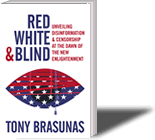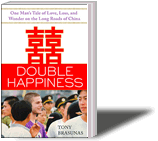My Long Sweet Journey into Print
(Part II)
28 2015
After a long journey during which I considered many options, and not just the main two options we’re discussing here, I realized something: It was going to be hard. It was going to be a lot of work. And I was at a fork in the road.
(This is Part II of my Indie Publishing Trilogy of posts. See Part I for the pros and cons of independent and traditional publishing. This post covers how I made my choice. Part III lists Seven Things You Need to Do if You Publish Your Book Independently.)
I knew it would be a lot of work either way I went — whether I sold the manuscript to a publishing house, or published my book independently. I was intimidated, but I was optimistic and determined as well. I decided, first, that while writing Double Happiness — during the years of rewrites and revisions — I would also approach literary agents in the hope of landing a publishing deal.
I was right. It was a lot of work. I ended up spending almost as much time writing query letters, synopses, proposals, and chapter summaries as I did revising the book. It turns out, you have to know a lot about the industry just to write a decent cover letter.
For all of my work, I did receive significant interest, and many agencies requested partials of my manuscript. Some agencies showed enthusiasm and requested the whole manuscript. Still, all eventually led to rejections.
After nearly a decade of work, as I was completing the final, final revision of Double Happiness, I leapt into exploring the independent route.
What I found was exhilarating and daunting. I still had so much to learn. But I was thrilled and, armed with a manuscript I knew was great, I felt ready to do it. I was ready to publish my book myself.
A Strange Coincidence
Coincidentally, just as I decided to go indie, I was approached by several literary agents who showed real interest. Two agencies went all the way and offered to sign me. It was mystifying. Did they want me now only because I wasn’t seeking them? Had my manuscript improved so much? Were they paying attention to me because I had started blogging?
I had my theories, but I really wasn’t sure.
I spoke with them both on the phone. Hour-long conversations. Should I really let go of independent publishing already?
In the end it was too tempting. One of the agents simply loved the book; she was smart, she was enthusiastic, and she really got it. Not only that, she said she knew several publishers looking for this type of book. She estimated she’d land me a deal in 3-6 months.
It was a wonderful time, and I did it. I handed her my creation, and I signed over 15% of all present and future royalties to her.
The Whisper of Intuition
After three months, the joy turned to patience. I hadn’t heard anything concrete from her, only a few quick emails. After six months, the patience turned to confusion. My agent wasn’t communicating regularly with me and when she did she seemed less certain about my book.
My intuition was whispering to me to take it back into my own hands. One whole premise of Double Happiness is trusting yourself, taking a chance on yourself, following your instincts. Maybe I need to publish Double Happiness that way.
Twelve months turned to fourteen, and that’s what I did. My agent and I met, and we came to friendly agreement. She hadn’t sold the manuscript, and I was feeling drawn towards the indie path. She gave me abundant encouragement as we parted ways; I have absolutely nothing negative to say about her.
And there it is. Perhaps I should have gone indie from the start, and not spent so much time and energy chasing agents and publishers. Or maybe I was inches from a deal and I should given my agent more time, or gone back to the other agency. Ultimately I went indie, for the powerful reasons listed in Part I of this trilogy post, and the intuitive reason listed above, and it’s been an amazing and fulfilling ride ever since. It’s been hard, and it’s been beautiful.
So Which Is Better? And Which Is Harder?
In retrospect, I think that publishing independently involved far more work personally than selling the manuscript to a corporate publishing house would have. But that’s not taking into consideration the years of work I put in — almost another book! — writing up countless query letters, synopses, proposals, excerpts, and cover letters to approach agents and houses, only to be rejected.
Both are hard. Both require work. Probably, to paraphrase Double Happiness on page 286:
No choice is wrong. You learn from either decision. Both paths take you home.
Writing is a journey. So is publishing.
Don’t go too slow. Don’t spend months or years banging your head on Manhattan’s iron-clad doors trying to get an agent. But if it happens quickly and easily, it can be a great thing.
Don’t go too fast. Don’t publish independently too quickly, before you have written the best book you possibly can, or before you have a marketing and publicity plan in place. Once you have your dynamite manuscript and your assiduous marketing plan, going the indie route can be a great thing.
Part III: Seven Things to Do if You Go Indie
Ultimately I went the adventurous indie route, and it’s been a great journey. My next article details what to do and what to expect if you do choose to publish independently. I identify Seven Key Things You Absolutely Must Do to Publish a Beautiful and Popular Book Independently.
Let me know how your writing and your own sweet journey into print is going in the comments below.
Posted in Double Happiness | Independent Publishing | Writing
by Tony Brasunas on July 28, 2015





Connect & Share